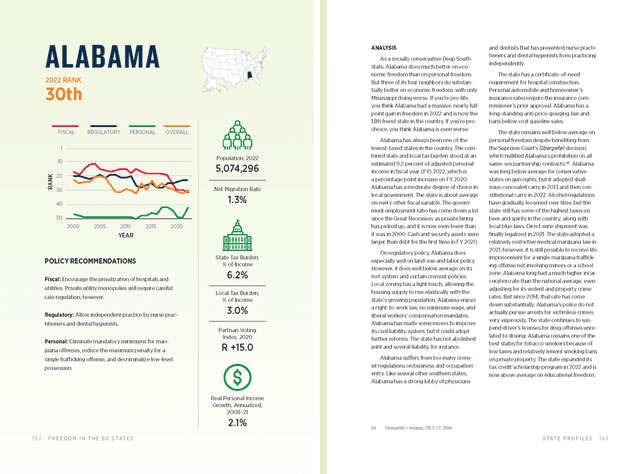Policy Recommendations
- Fiscal Encourage the privatization of hospitals and utilities. Private utility monopolies will require careful rate regulation, however.
- Regulatory Allow independent practice by nurse practitioners and dental hygienists.
- Personal Eliminate mandatory minimums for marijuana offenses, reduce the maximum penalty for a single trafficking offense, and decriminalize low-level possession.
Analysis
As a socially conservative Deep South state, Alabama does much better on economic freedom than on personal freedom. But three of its four neighbors do substantially better on economic freedom, with only Mississippi doing worse. If you’re pro-life, you think Alabama had a massive, nearly full-point gain in freedom in 2022 and is now the 13th freest state in the country. If you’re pro-choice, you think Alabama is even worse.
Alabama has always been one of the lowest-taxed states in the country. The combined state and local tax burden stood at an estimated 9.2 percent of adjusted personal income in fiscal year (FY) 2022, which is a percentage point increase on FY 2020. Alabama has a moderate degree of choice in local government. The state is about average on every other fiscal variable. The government employment ratio has come down a lot since the Great Recession, as private hiring has picked up, and it is now even lower than it was in 2000. Cash and security assets were larger than debt for the first time in FY 2020.
On regulatory policy, Alabama does especially well on land-use and labor policy. However, it does well below average on its tort system and certain cronyist policies. Local zoning has a light touch, allowing the housing supply to rise elastically with the state’s growing population. Alabama enjoys a right-to-work law, no minimum wage, and liberal workers’ compensation mandates. Alabama has made some moves to improve its civil liability system, but it could adopt further reforms. The state has not abolished joint and several liability, for instance.
Alabama suffers from too many cronyist regulations on business and occupation entry. Like several other southern states, Alabama has a strong lobby of physicians and dentists that has prevented nurse practitioners and dental hygienists from practicing independently.
The state has a certificate-of-need requirement for hospital construction. Personal automobile and homeowner’s insurance rates require the insurance commissioner’s prior approval. Alabama has a long-standing anti-price-gouging law and bans below-cost gasoline sales.
The state remains well below average on personal freedom despite benefiting from the Supreme Court’s Obergefell decision, which nullified Alabama’s prohibition on all same-sex partnership contracts. Alabama was long below average for conservative states on gun rights, but it adopted shall-issue concealed carry in 2013 and then constitutional carry in 2022. Alcohol regulations have gradually loosened over time, but the state still has some of the highest taxes on beer and spirits in the country, along with local blue laws. Direct wine shipment was finally legalized in 2021. The state adopted a relatively restrictive medical marijuana law in 2021; however, it is still possible to receive life imprisonment for a single marijuana trafficking offense not involving minors or a school zone. Alabama long had a much higher incarceration rate than the national average, even adjusting for its violent and property crime rates. But since 2014, that rate has come down substantially. Alabama’s police do not actually pursue arrests for victimless crimes very vigorously. The state continues to suspend driver’s licenses for drug offenses unrelated to driving. Alabama remains one of the best states for tobacco smokers because of low taxes and relatively lenient smoking bans on private property. The state expanded its tax credit scholarship program in 2022 and is now above average on educational freedom.

